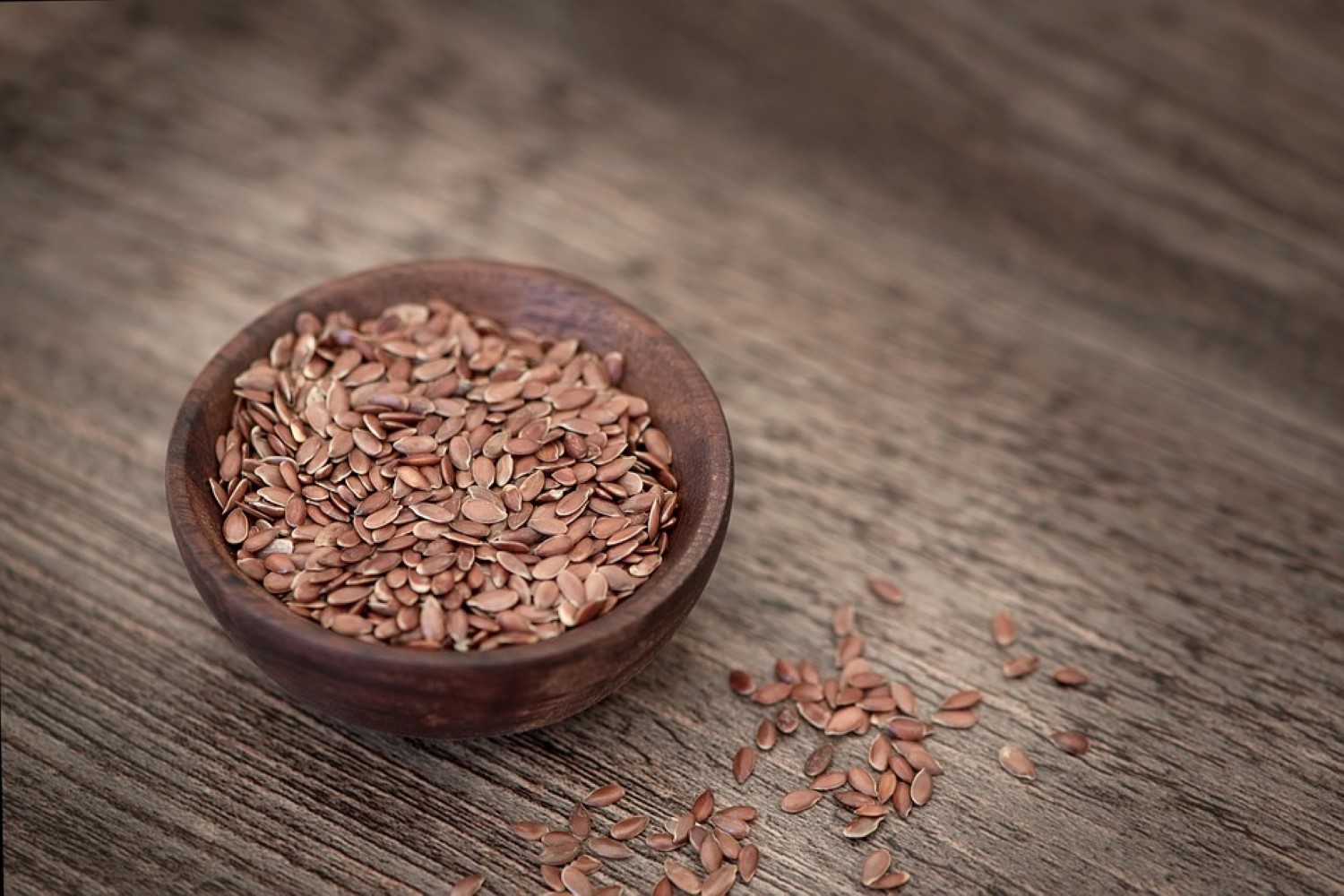
Flaxseed oil, source of fiber and omega-3, for food and the skin.
Its properties make this oil necessary in the kitchen and a natural cosmetic to take into account. In this article we explain its benefits and applications for food and cosmetics.
If there is a versatile plant, that would be the linen. Its fiber is used to make clothes and to manufacture ropes, the seeds can be added to the food and oil can be applied in dishes and the skin itself. It is so profitable that even its scientific name makes reference to it: Linum usitatissimum, that is, very used linen.
Its cultivation dates back five thousand years and its consumption in the kitchen is not in vain. The plant contains great nutritional properties due to the presence of two key components: fiber and alpha linolenic acid (ALA).
Both provide a elevated antioxidant and desinflammatory capacity and regulates the intestinal transit, being therefore a beneficial product in heart conditions, tumor processes, neurological diseases and constipation.
To explain the benefits of flaxseed oil, let’s reveal first some characteristics of its main ingredients.

Linen plant has a diverse use: for clothes, ropes, food and cosmetics.
Contenido del artículo
What is the alpha linolenic acid?
The Alpha linolenic acid is an essential fatty acid belonging to the omega-3 family.
The omega-3 acids (ω-3) are polyunsaturated fats that participate in numerous functions of the cardiac, immune, endocrine and cellular systems.
They are also important because they help to correct the decompensation between omega-3 and omega-6 acids, since the latter contributes to inflammation of the body, while the former one participates in the synthesis of prostaglandins, which fight inflammation.
As for alpha linolenic acid, it must be ingested through food and dietary supplements since the human body does not generate them on its own.
Flax seeds are one of the most abundant sources of omega-3 as it contains ALA in around 57%.
The importance of fiber
Before continuing, we must differentiate between soluble and non-soluble fiber. The first one retains a lot of water and ferments in the intestine, the opposite of the second one. However, both are necessary and complementary in order to facilitate intestinal transit.
The soluble fiber also slows down the absorption of fats and sugars in food, being a significant instrument to control diabetes and the body weight.
Flax contains an appreciable amount of soluble fiber: 27 grams per 100 gr. of seeds.
Note also the presence of lignans (which should not be confused with lignin). These are polyphenolic substances similar to fiber – and therefore beneficial for the intestine – but with the addition of exercising antioxidant functions.
Benefits of flaxseed oil
The regular intake of flaxseed oil and flax seeds along with a healthy lifestyle help slow down:
Cardiac diseases: due to the inflammatory action of the omega-3 acids and the antioxidant activity of lignans as polyphenols prevent the accumulation of low density lipoproteins and triglycerides in the arteries.
Diabetes and insulin resistance: for the large amount of soluble fiber.
Autoimmune diseases: for its anti-inflammatory action.
Cancer. For three reasons:
1. The action of lignans in hormones, especially in breast and prostate cancers.
2. The antioxidant activity of lignans against free radicals, responsible in part for cancerous tumors. Read more about the effects of the antioxidants.
3. The increase in the activity of detoxifying enzymes that eliminate carcinogenic or precancerous agents.
Neurological diseases: due to the antioxidant action of polyphenols and because omega-3 acids are part of the neuronal membranes, the place where the biochemical reactions necessary for the proper functioning of the brain are produced.

Flaxseeds oil can be used as a comestic to nourish the skin, hair and nails.
Cosmetic properties
Flaxseed oil helps strengthen the nails and hair as linen is also rich in vitamin E and B.
It should be noted that the presence of minerals such as phosphorus, calcium, potassium and magnesium.
Flaxseed oil can be taken orally – directly or through nutraceutical supplements – or applied to the skin. The absorption is less in the second case although the ointment is used as a remedy to cure burns in a similar way to Rose Hip Oil.
Advantages of flaxseed oil in cosmetic formulas
Nowadays the concept of beauty goes beyond the physical aspect. Personal care is conceived as an integral exercise in which it matters what is ingested, what is applied to the skin and the scenarios to which the organism is subjected. It is a holistic concept in which natural ingredients are key.
Consumers demand more and more cosmetic products that care for and nourish the skin, as well as contemplating factors such as authenticity, ethics and sustainability. Brands, on the other hand, tend to bet on experience and sensoriality. Natural cosmetics crosses both and, in this sense, flaxseed oil satisfies both demands.
If you want to market or apply flaxseed oil in your formulas, contact Nutexa for more information and advice.
Access to Nutexa oils catalog through this link.
BIBLIOGRAPHY
Aberg UW., Saarinen N., Abrahamsson A. et al. (2011). Tamoxifen and flaxseed alter angiogenesis regulators in normal human breast tissue in vivo. PLoS One; 6 (9): e25720.
Caroprese M., Marzano A., Marino R. et al. (2010). Flaxseed supplementation improves fatty acid profile of cow milk. Journal of Dairy Science; 93, (6), pp 2580-2588.
Fofana B., Cloutier S., Kirby CW. et al. (2011). A well balanced omega-6/omega-3 ratio in developing flax bolls after heating and its implications for use as a fresh vegetable by humans. Food Research International, 44 (8), pp 2459-2464.
Fukumitsu S., Aida K., Shimizu H et al. (2010). Flaxseed lignan lowers blood cholesterol and decreases liver disease risk factors in moderately hypercholesterolemic men. Nutrition Research. 30 (7), pp 441-446. 2010.
Hallund J., Tetens I., Bugel S. et al. (2008). The effect of a lignan complex isolated from flaxseed on inflammation markers in healthy postmenopausal women. Nutrition, Metabolism and Cardiovascular Diseases. 18 (7), pp 497-502.
Landete JM. Plant and mammalian lignans: A review of source, intake, metabolism, intestinal bacteria and health. Food Research International. 46 (1), pp 410-424.
Morais D de C., Moraes EA., Dantas MI de S. et al. (2011). Heat Treatment and Thirty-Day Storage Period Do Not Affect the Stability of Omega-3 Fatty Acid in Brown Flaxseed (Linum Usitatissimum) Whole Flour. Food and Nutrition Sciences.
What’s New and Beneficial About Flaxseeds. The World’s Healthiest Foods. http://www.whfoods.com/genpage.php?tname=foodspice&dbid=81
Ácidos grasos Omega-3. National Institutes of Health. https://ods.od.nih.gov/factsheets/Omega3FattyAcids-DatosEnEspanol/




